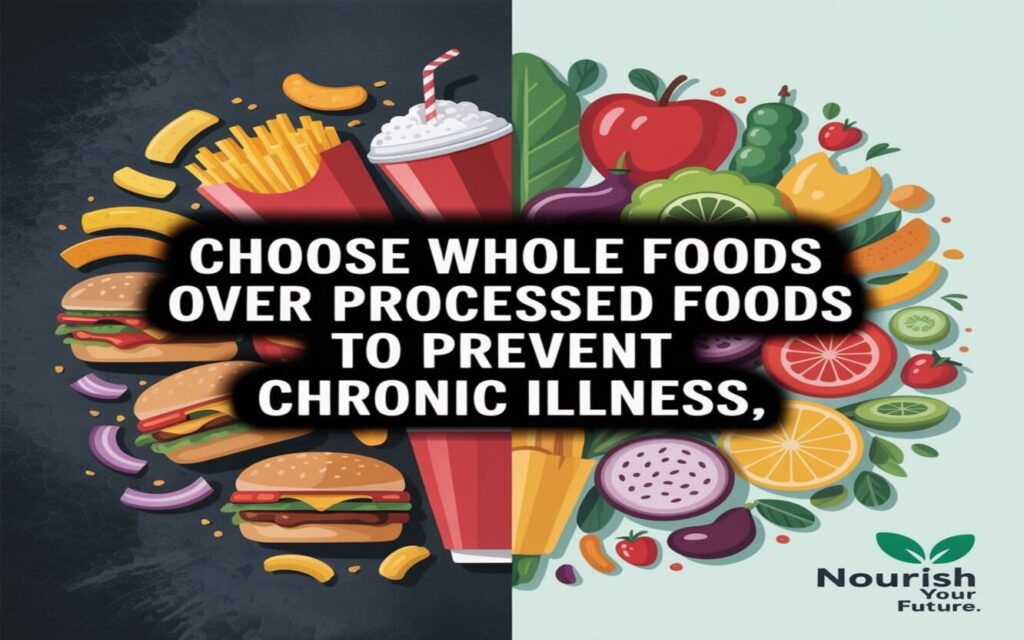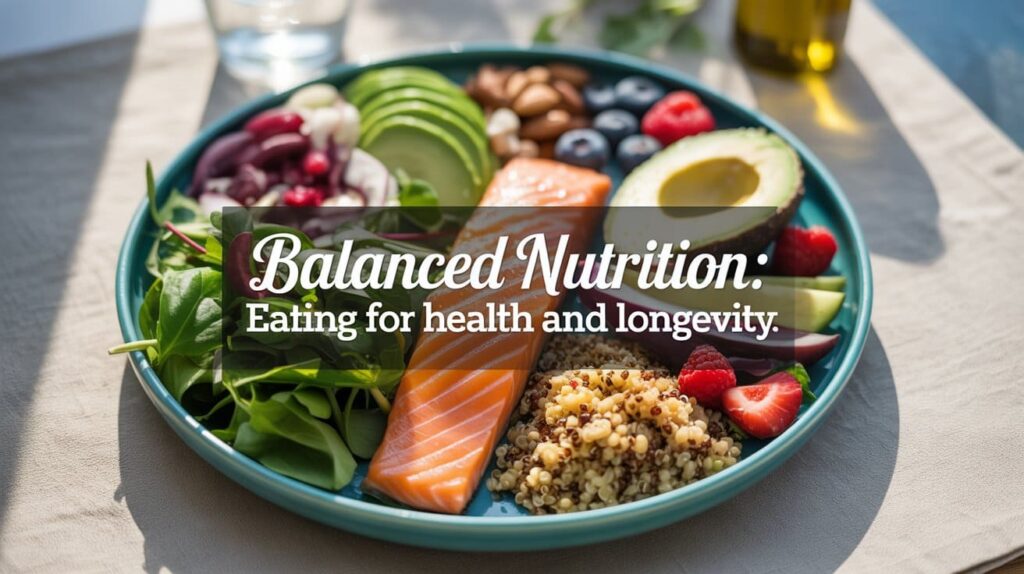
Introduction
In today’s fast-paced world, diet and nutrition play an increasingly vital role in determining long-term health outcomes. A balanced diet is not merely about maintaining an ideal weight—it is about strengthening the immune system, reducing the risk of chronic diseases, and enhancing overall well-being. Studies across the globe, from Asia, America, and Europe, highlight that poor eating habits are directly linked to conditions such as heart disease, type 2 diabetes, obesity, certain cancers, and autoimmune disorders (World Health Organization, 2023).
Healthy eating is therefore a powerful preventive tool, and one of the most accessible ways to promote health naturally. By consuming nutrient-dense foods—rich in vitamins, minerals, fiber, antioxidants, and healthy fats—individuals can significantly improve their quality of life, fight disease, and even slow the process of aging.
This article explores the science behind healthy eating, examines the relationship between diet and chronic disease, and presents practical strategies for adopting a lifestyle that supports longevity and vitality.

The Connection Between Nutrition and Chronic Disease
1. Poor Diet as a Leading Risk Factor
Research by the Global Burden of Disease Study (2020) found that unhealthy diets are among the leading causes of premature death worldwide. High intake of processed foods, added sugars, refined carbohydrates, and trans fats increases the risk of cardiovascular diseases, metabolic disorders, and inflammatory conditions (Afshin et al., 2019).
2. Protective Power of Nutrients
Nutrient-rich foods supply the body with protective compounds such as:
- Antioxidants (found in berries, green tea, and leafy greens) which reduce oxidative stress.
- Omega-3 fatty acids (found in salmon, chia seeds, and walnuts) which lower inflammation.
- Dietary fiber (from whole grains, legumes, fruits, and vegetables) which supports gut health and regulates blood sugar.
- Phytonutrients (like flavonoids and carotenoids) which strengthen immunity and reduce cancer risk.
3. Chronic Diseases Linked to Unhealthy Diets
- Cardiovascular disease : Excessive intake of saturated and trans fats increases cholesterol and blood pressure.
- Type 2 diabetes : Refined sugar and low fiber diets impair insulin sensitivity.
- Obesity: Calorie-dense, nutrient-poor foods contribute to weight gain and metabolic syndrome.
- Cancer: Diets low in fruits and vegetables but high in processed meats are linked to colorectal and stomach cancers.
- Neurodegenerative disorders: Poor nutrition may accelerate cognitive decline and Alzheimer’s disease progression (Harvard School of Public Health, 2022).

Key Principles of Healthy Eating
To harness the power of nutrition, health experts emphasize the following evidence-based dietary practices:
1. Prioritize Whole Foods
Whole, unprocessed foods provide higher nutrient density compared to refined or packaged products. Examples include fresh vegetables, fruits, whole grains, legumes, nuts, seeds, fish, and lean meats.
2. Balance Macronutrients
The body requires carbohydrates, proteins, and fats in the right proportions:
- Carbohydrates: Prefer complex sources such as quinoa, oats, and brown rice.
- Proteins: Incorporate both animal (fish, poultry, eggs) and plant-based sources (beans, lentils, tofu).
- Fats: Focus on unsaturated fats (olive oil, avocados, nuts) while limiting saturated and trans fats.
3. Increase Plant-Based Foods
The Mediterranean diet and DASH diet (Dietary Approaches to Stop Hypertension) are globally recognized for their ability to reduce chronic disease risks. Both emphasize fruits, vegetables, legumes, and whole grains as dietary staples (Estruch et al., 2018).
4. Reduce Added Sugars and Processed Foods
High consumption of refined sugars is linked to obesity, fatty liver disease, and insulin resistance. WHO recommends limiting added sugars to less than 10% of daily energy intake (WHO, 2020).

Table : Healthy Foods vs. Disease Prevention
| Food Category | Key Nutrients | Chronic Disease Benefits |
|---|---|---|
| Citrus fruits, berries | Vitamin C, antioxidants | Boost immunity, reduce oxidative stress |
| Fatty fish (salmon, tuna) | Omega-3 fatty acids | Lower heart disease risk, reduce inflammation |
| Leafy greens (spinach) | Vitamins A, K, magnesium | Bone health, cancer prevention |
| Whole grains (oats, quinoa) | Fiber, B vitamins | Improve digestion, reduce diabetes risk |
| Nuts and seeds | Healthy fats, protein, zinc | Support brain and heart health, enhance immune response |
| Garlic, turmeric, ginger | Bioactive compounds (allicin, curcumin, gingerol) | Anti-inflammatory, anti-cancer properties |
Recent Scientific Evidence
- Mediterranean Diet Studies (Europe) : The PREDIMED trial in Spain showed that adherence to a Mediterranean diet reduced the risk of cardiovascular events by 30% (Estruch et al., 2018).
- Asian Studies on Green Tea : Research in Japan highlighted that green tea consumption reduces cardiovascular mortality and supports healthy aging (Kuriyama et al., 2006).
- American Studies on Whole Foods : Harvard University’s School of Public Health demonstrated that diets high in fruits, vegetables, and whole grains significantly reduce the risk of premature death (Harvard, 2022).

Lifestyle Factors Beyond Nutrition
While healthy eating is central, other lifestyle habits amplify its benefits:
- Regular exercise : Improves cardiovascular and metabolic health.
- Adequate sleep : Supports hormone regulation and immunity.
- Stress management : Chronic stress leads to inflammation and poor dietary choices.
- Hydration : Water is essential for detoxification and metabolic function.
Key Points
- Healthy eating is one of the most effective ways to prevent and manage chronic diseases.
- Whole foods, plant-based diets, and nutrient-dense meals reduce inflammation and oxidative stress.
- Global studies confirm the role of nutrition in lowering the risks of heart disease, diabetes, obesity, cancer, and cognitive decline.
- Combining healthy eating with exercise, stress management, and sleep creates a holistic approach to long-term health.
Conclusion
The evidence is overwhelming : food is medicine. The choices we make at every meal determine not only our present vitality but also our long-term health outcomes. By adopting a diet rich in fruits, vegetables, whole grains, lean proteins, and healthy fats, while limiting processed foods and added sugars, individuals can significantly reduce the risk of chronic disease.
As medical studies from across Asia, America, and Europe consistently demonstrate, nutrition has the power to prevent illness, promote wellness, and extend life expectancy. Healthy eating is not simply a lifestyle trend—it is a scientifically proven strategy for disease prevention and health promotion.
By embracing the power of healthy eating, we are investing in a healthier future, one meal at a time.
References
- Afshin A, et al. (2019). Health effects of dietary risks in 195 countries, 1990–2017: a systematic analysis. The Lancet.
- Estruch R, et al. (2018). Primary prevention of cardiovascular disease with a Mediterranean diet. New England Journal of Medicine.
- Harvard School of Public Health. (2022). Nutrition and chronic disease prevention. [Website]
- Kuriyama S, et al. (2006). Green tea consumption and mortality due to cardiovascular disease. JAMA.
- World Health Organization. (2020). Guideline: Sugars intake for adults and children.
- World Health Organization. (2023). Diet, nutrition, and the prevention of chronic diseases. [WHO Report]







